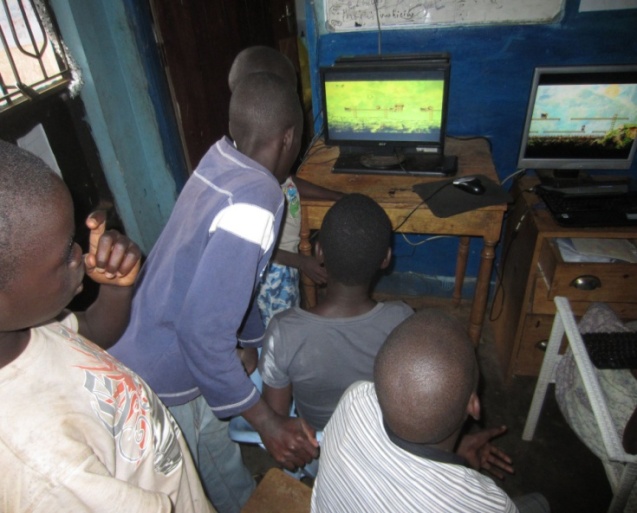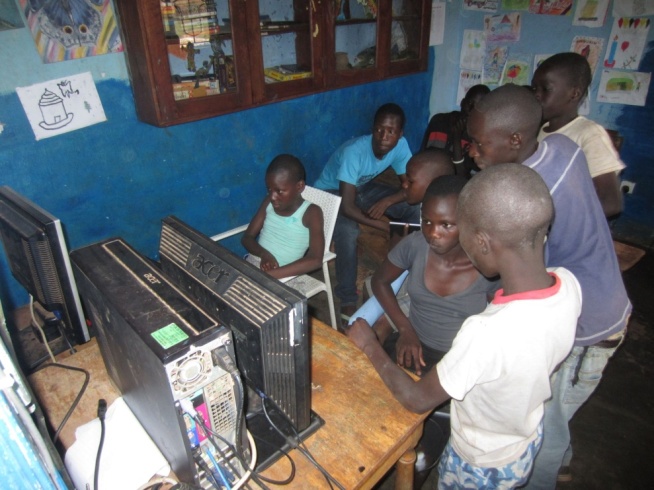Ugandan children living in slum districts and isolated rural areas have limited opportunities to learn to read and this affects all their educational years, so that they grow up not realising their full potential. This has become evident to us during the last four years of working at the Chrysalis Centre in Kampala, Uganda, amongst children living in a nearby slum. However, the issue of low reading ability is not restricted to deprived urban areas. It is, if anything, more prevalent in rural village areas, where there are fewer teachers able to teach reading and where there tends to be less commitment to education. It is for these reasons that we are launching a new fundraising initiative designed to improve reading abilities in Ugandan children and awareness elsewhere about the issues involved.
While most children attending the Chrysalis Centre are registered at a school, the majority of them do not have 100% attendance, very many of them missing more than half of their school tuition. This leads to failure in the end of year exams and the necessity to repeat the school year, in some cases multiple times. In the Acholi Quarter slum area, there are no schools offering free tuition, even government schools, so the issue of free education comes only to those fortunate enough to find an educational sponsor. The family unit in the slum area can be very chaotic, with men often ignoring their parental duties and drowning their sorrows in alcohol. In contrast, the mothers work hard in low-paid work – bottle-picking, quarrying, banana-selling – as so few of them have education of any kind. These jobs generate too little income for anything more than food and charcoal for the family (and perhaps rent) and thus these families really struggle to buy even the books and pens that the children need for school, let alone being able to pay for them to attend school.
So, despite stories to the contrary, Universal Primary Education is simply not available in Kampalan slum districts and the tiny number of schools offering free education are only the tip of an iceberg of provision that is required for children living in the capital. Thus, sporadic school attendance has led to a lack of reading ability amongst even the most intelligent and capable of children. Of our Chrysalis members 55% had no, or low, reading ability. Older siblings, who often can read, have little chance to teach their brothers and sisters how to read, as there are so few story books at the varying reading age levels available to use as resource material.
Campaign Aims and Objectives
At Chrysalis Limited, we believe that reading opens up the world to children, enabling them to achieve their potential, so we plan to set up a long-term reading project. Initially, this will be through serving the communities in which we currently work, in Kireka and Gulu (northern Uganda) but, over time, providing resources to other NGOs working with children, to enable them to deliver similar programmes.
Reading is also very critical for children being able to access the learning available on the internet which, over the next few years, is going to help supplement their school education as curriculum evolves in Uganda. Without an ability to read, the technological revolution will likely pass them by. Therefore we aim to utilise recognised software and technology to teach reading, not just by utilising books, but also on-line mechanisms and even mobile phone apps.
While we aim to ensure every child can read, we believe that the Buddy system will encourage the more proficient readers to start reading more than they were before, due to a ready access to story books. We know that developing creativity inspires problem-solving and children can develop confidence in this area by reading about children who strive against adversity and succeed. In Uganda, there are very many inspiring and talented children, though we in the West often see African children portrayed as helpless. In this campaign we want to encourage more awareness of the capabilities of these children, if they are given support in education, enabling African children to inspire those living in more privileged circumstances, as well as showcasing some African authors who have written for children and who European children will enjoy reading too.
By highlighting this issue to children in schools, we can link up children internationally via Skype, allowing them access to find out about each other’s lives, with reading as the first talking point.
Chrysalis Limited has a track record in teaching children skills to pass onto others, through encouraging them to be selfless. We believe that, in countries where children represent the bulk of the population, peer-learning is a key part of a solution to the speedy improvement in education levels. Over time, this might also create more capable teachers, as children discover the rewards of bringing knowledge to others.
Finally, we aim that the teaching of reading will enable disadvantaged children to perform better at school, no longer needing to repeat a school year, and thus moving more quickly through school, avoiding the embarrassment of 18 year-olds studying beside 10 year-olds.
Methodology
At the Chrysalis Centre, roughly half of attendees have some reading ability, though even these are not comparable to their peers in the UK. We intend to train these up to become “Reading Buddies”, who will earn points for teaching others how to read. Their points can be exchanged for treats during holidays, perhaps a tour around Kampala, a trip to the zoo or swimming, or even visits to the theatre, none of which slum children would have any expectation of being able to do. Those learning to read through this process will also receive the same points for participating.
International Dimension and Fundraising
We intend to do a reading marathon using Skype, linking children from Kampalan slum areas (our Reading Buddies) with children in UK schools. They will take turns in reading passages from their favourite books. Each UK participant will need to find people to sponsor them in participating, in order to raise money to fund the practicalities of this project. In time, we aim to have Ugandan children reading the same passages back to the children in the UK. We hope to attract some UK schools to participate, by putting up videos of their children reading their favourite books and pledging to send a copy across to us in Uganda. Perhaps we might also encourage some schools to purchase books by African authors to study in their English classes and thus learn more about the lives of people in Africa.
However, to realise this, we will need to attract some support in a variety of ways:
- We need books at a variety of reading abilities, from beginners to advanced children’s books and a means of sending them to Kampala;
- We need some additional technology to increase our capacity to use some of the on-line reading mechanisms – Smart phones, tablets, laptops – and a means of ending them to Kampala;
- We need advice and expertise on which apps, books and sites are the most effective for this process and which are the easiest for our Buddies to be using;
- Support and ideas for treats in Kampala and Gulu;
- Finance to cover Chrysalis costs in delivering the programme via the Readathon;
- Schools or youth organisations interested in working with us to include UK children in the project.
IF YOU WOULD LIKE TO ORGANISE OR DO A SINGLE-HANDED READATHON, THEN YOU CAN FIND MORE INFORMATION INCLUDING SPONSORSHIP FORMS HERE.
IF YOU WOULD SIMPLY LIKE TO SUPPORT OUR READING PROGRAMME FINANCIALLY, THEN PLEASE CLICK HERE FOR PAYPAL, OR SEND A CHEQUE MADE PAYABLE TO CHRYSALIS YOUTH EMPOWERMENT NETWORK TO:
Chrysalis Youth Empowerment Network (Readathon), 31 Prince of Wales Lane, Yardley Wood, Birmingham, B14 4LB.
Gift aid forms are available at this link.
Thank you.




